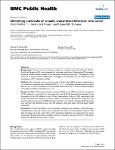Identifying outbreaks of sexually transmitted infection: who cares?
Werber, Dirk
Evans, Meirion R
Thomas, Daniel Rh
Background: Current routine surveillance schemes for sexually transmitted infections (STIs) in the United Kingdom (UK) are not designed for outbreak identification. Recognising STI outbreaks, therefore, depends almost entirely on the alertness of health professionals. The objective of this study was to explore health professionals' knowledge of, and attitudes towards, identification and investigation of STI outbreaks in Wales. Methods: We conducted a cross-sectional survey in Wales in June 2005, and sent a questionnaire to consultants of genitourinary medicine (GUM, n = 11), a consultant microbiologist from each laboratory (n = 14), all consultants in communicable disease control (n = 5), and to epidemiologists of the National Public Health Service (n = 4). Results: 26 (76%) of 34 survey recipients responded. Of these, 17 (65%) ranked the investigation of STI outbreaks as important or very important, and 19 (73%) perceived participation in the investigation of an STI outbreak as part of their responsibility. Only six (25%) respondents had actively searched their computer system or patient records for a possible STI outbreak in the previous twelve months, and 15 (63%) had never looked for an outbreak. Of seven GUM physicians who said they had identified at least one STI outbreak, three had never informed public health authorities. Conclusion: Prompt identification and coordinated investigation of outbreaks, usually through a multidisciplinary outbreak control team, is central to the control of many infectious diseases. This does not appear to be the case for STIs, which we believe represents a lost opportunity to reduce transmission. Besides improved surveillance methods, a change in culture towards STI outbreaks is needed among health professionals in Wales.
Dateien zu dieser Publikation
Keine Lizenzangabe

